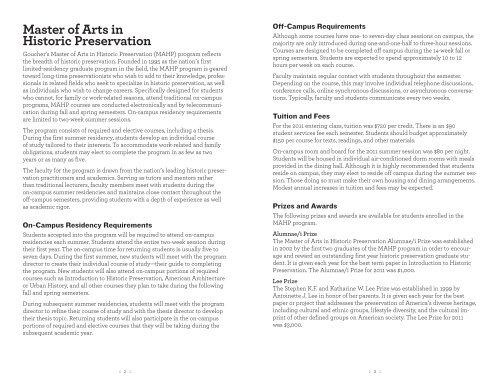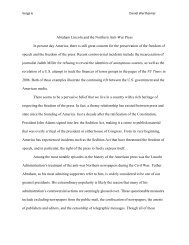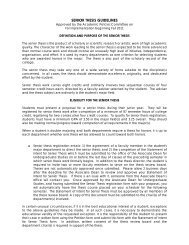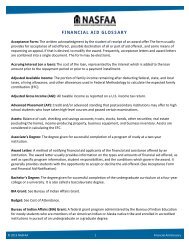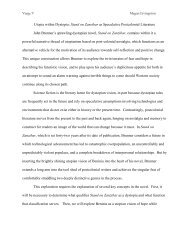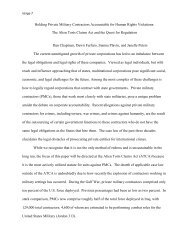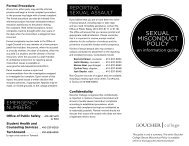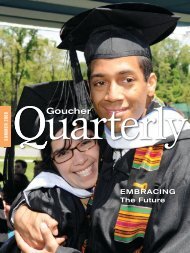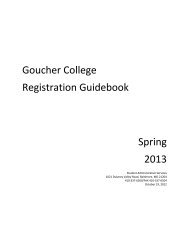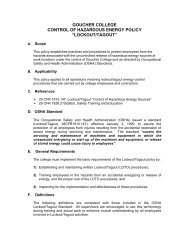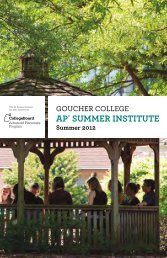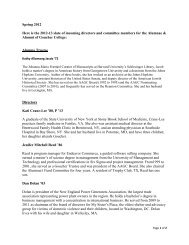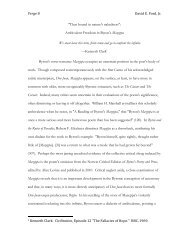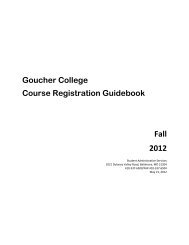Course Catalogue 2012-13 - Goucher College
Course Catalogue 2012-13 - Goucher College
Course Catalogue 2012-13 - Goucher College
You also want an ePaper? Increase the reach of your titles
YUMPU automatically turns print PDFs into web optimized ePapers that Google loves.
Master of Arts in<br />
Historic Preservation<br />
<strong>Goucher</strong>’s Master of Arts in Historic Preservation (MAHP) program reflects<br />
the breadth of historic preservation. Founded in 1995 as the nation’s first<br />
limited-residency graduate program in the field, the MAHP program is geared<br />
toward long-time preservationists who wish to add to their knowledge, professionals<br />
in related fields who seek to specialize in historic preservation, as well<br />
as individuals who wish to change careers. Specifically designed for students<br />
who cannot, for family or work-related reasons, attend traditional on-campus<br />
programs, MAHP courses are conducted electronically and by telecommunication<br />
during fall and spring semesters. On-campus residency requirements<br />
are limited to two-week summer sessions.<br />
The program consists of required and elective courses, including a thesis.<br />
During the first summer residency, students develop an individual course<br />
of study tailored to their interests. To accommodate work-related and family<br />
obligations, students may elect to complete the program in as few as two<br />
years or as many as five.<br />
The faculty for the program is drawn from the nation’s leading historic preservation<br />
practitioners and academics. Serving as tutors and mentors rather<br />
than traditional lecturers, faculty members meet with students during the<br />
on-campus summer residencies and maintains close contact throughout the<br />
off-campus semesters, providing students with a depth of experience as well<br />
as academic rigor.<br />
On-Campus Residency Requirements<br />
Students accepted into the program will be required to attend on-campus<br />
residencies each summer. Students attend the entire two-week session during<br />
their first year. The on-campus time for returning students is usually five to<br />
seven days. During the first summer, new students will meet with the program<br />
director to create their individual course of study—their guide to completing<br />
the program. New students will also attend on-campus portions of required<br />
courses such as Introduction to Historic Preservation, American Architecture<br />
or Urban History, and all other courses they plan to take during the following<br />
fall and spring semesters.<br />
During subsequent summer residencies, students will meet with the program<br />
director to refine their course of study and with the thesis director to develop<br />
their thesis topic. Returning students will also participate in the on-campus<br />
portions of required and elective courses that they will be taking during the<br />
subsequent academic year.<br />
Off-Campus Requirements<br />
Although some courses have one- to seven-day class sessions on campus, the<br />
majority are only introduced during one-and-one-half to three-hour sessions.<br />
<strong>Course</strong>s are designed to be completed off campus during the 14-week fall or<br />
spring semesters. Students are expected to spend approximately 10 to 12<br />
hours per week on each course.<br />
Faculty maintain regular contact with students throughout the semester.<br />
Depending on the course, this may involve individual telephone discussions,<br />
conference calls, online synchronous discussions, or asynchronous conversations.<br />
Typically, faculty and students communicate every two weeks.<br />
Tuition and Fees<br />
For the 2011 entering class, tuition was $720 per credit. There is an $90<br />
student services fee each semester. Students should budget approximately<br />
$150 per course for texts, readings, and other materials.<br />
On-campus room and board for the 2011 summer session was $80 per night.<br />
Students will be housed in individual air-conditioned dorm rooms with meals<br />
provided in the dining hall. Although it is highly recommended that students<br />
reside on campus, they may elect to reside off campus during the summer session.<br />
Those doing so must make their own housing and dining arrangements.<br />
Modest annual increases in tuition and fees may be expected.<br />
Prizes and Awards<br />
The following prizes and awards are available for students enrolled in the<br />
MAHP program.<br />
Alumnae/i Prize<br />
The Master of Arts in Historic Preservation Alumnae/i Prize was established<br />
in 2002 by the first two graduates of the MAHP program in order to encourage<br />
and reward an outstanding first year historic preservation graduate student.<br />
It is given each year for the best term paper in Introduction to Historic<br />
Preservation. The Alumnae/i Prize for 2011 was $1,000.<br />
Lee Prize<br />
The Stephen K.F. and Katharine W. Lee Prize was established in 1999 by<br />
Antoinette J. Lee in honor of her parents. It is given each year for the best<br />
paper or project that addresses the preservation of America’s diverse heritage,<br />
including cultural and ethnic groups, lifestyle diversity, and the cultural imprint<br />
of other defined groups on American society. The Lee Prize for 2011<br />
was $3,000.<br />
::: 2 ::: ::: 3 :::


